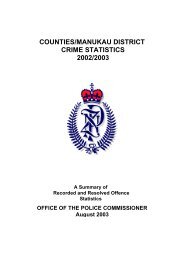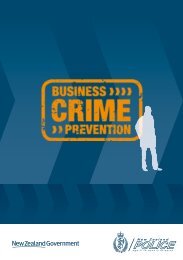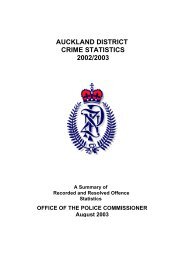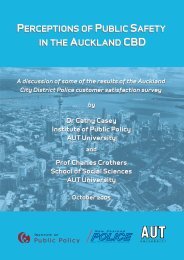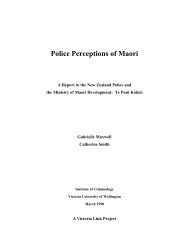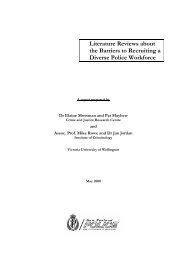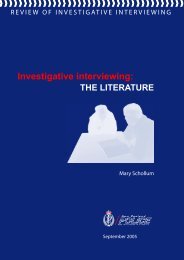Electronic Crime Strategy to 2010 - New Zealand Police
Electronic Crime Strategy to 2010 - New Zealand Police
Electronic Crime Strategy to 2010 - New Zealand Police
You also want an ePaper? Increase the reach of your titles
YUMPU automatically turns print PDFs into web optimized ePapers that Google loves.
The <strong>Crime</strong>s Amendment Act<br />
2003 came in<strong>to</strong> effect on<br />
1 Oc<strong>to</strong>ber 2003 and created<br />
four distinct new computer<br />
crimes.<br />
1. Accessing a computer<br />
system for a dishonest<br />
purpose.<br />
2. Damaging or interfering with a<br />
computer system.<br />
3. Making, selling, distributing<br />
or possessing software for<br />
committing crimes.<br />
4. Accessing a computer<br />
system without authorisation.<br />
This legislation now gives strong<br />
new protection against hackers.<br />
The Telecommunications<br />
(Interception Capability) Act<br />
2004 came in<strong>to</strong> force on<br />
5 April 2004. That Act allows<br />
<strong>Police</strong> <strong>to</strong> effectively carry<br />
out the lawful interception of<br />
telecommunications under an<br />
interception warrant obtained in<br />
circumstances such as where<br />
there are grounds for believing<br />
there is an organised criminal<br />
enterprise, serious violent<br />
offence, or drug dealing offence.<br />
A network opera<strong>to</strong>r must ensure<br />
that they provide an interception<br />
capability (although there is<br />
up <strong>to</strong> a five-year lead-in time<br />
for existing network opera<strong>to</strong>rs<br />
<strong>to</strong> provide the necessary<br />
interception capability). This law<br />
brings <strong>New</strong> <strong>Zealand</strong> in<strong>to</strong> line<br />
with other countries that allow<br />
their law enforcement agencies<br />
similar access.<br />
Industry<br />
The Security Research Group (SRG) of the University of Otago in partnership with<br />
the Computer Security Institute (CSI), the CCIP and <strong>Police</strong>, produced the 2005 <strong>New</strong><br />
<strong>Zealand</strong> Computer <strong>Crime</strong> and Security Survey of <strong>New</strong> <strong>Zealand</strong> businesses. The<br />
2005 survey found 60% of respondent organisations had experienced electronic<br />
attacks originating outside the organisation, showing a steady growth over the past<br />
five years. Average annual losses were estimated at $43,000 per organisation.<br />
Prevention of e-crime relies on industry organisations and public awareness. Having<br />
an effective regula<strong>to</strong>ry environment helps <strong>to</strong> ensure that organisations take measures<br />
<strong>to</strong> protect consumers. <strong>Police</strong> will support groups such as the Internet Safety Group,<br />
who assist in heightening community awareness and provide policy responses <strong>to</strong><br />
e-crime issues.<br />
Specialist ICT sec<strong>to</strong>r input is required for an effective response <strong>to</strong> many types of<br />
e-crime. <strong>Police</strong> will work with Internet service and telecommunication providers <strong>to</strong><br />
enable access <strong>to</strong> records of traffic information <strong>to</strong> assist the investigation of crime<br />
(pursuant <strong>to</strong> search warrants).<br />
It is essential <strong>to</strong> keep abreast of technology trends and changes in commonly used<br />
technology. <strong>Police</strong> will continue <strong>to</strong> establish and maintain relationships with major<br />
technology stakeholders, eg Microsoft and Cisco.<br />
International<br />
International partners include the G8 sub-group on High Tech <strong>Crime</strong>, Interpol, and<br />
the US Federal Bureau of Investigation. The South Pacific Chiefs of <strong>Police</strong> forum and<br />
the Australasian <strong>Police</strong> Ministers Council (APMC) are forums <strong>to</strong> coordinate regional<br />
response capability. <strong>Police</strong> will work with the APMC <strong>to</strong> improve the regular sharing of<br />
information, skills and response capability among e-crime managers.<br />
Inter-jurisdictional responses <strong>to</strong> e-crime are reliant on solid relationships and<br />
cooperation with international law enforcement organisations. <strong>Police</strong> will work with<br />
the United Nations Convention against Trans-National Organised <strong>Crime</strong> <strong>to</strong> address<br />
issues hindering <strong>Police</strong> ability <strong>to</strong> deal with international jurisdictions, including<br />
provision of mutual legal assistance, extradition, law-enforcement cooperation and<br />
technical assistance.<br />
Exhibits<br />
Capability<br />
Enhancing the skills <strong>to</strong> gather and assess electronic evidence is required <strong>to</strong> deal<br />
with information and communication technology issues that now confront many<br />
investigations. Equipping detectives and other staff with the skills <strong>to</strong> recognise and<br />
deal with electronic evidence will ensure that skills are available <strong>to</strong> conduct most<br />
<strong>Police</strong> investigations.<br />
<strong>Police</strong> maintain the ECL <strong>to</strong> provide forensic support <strong>to</strong> investigations and<br />
prosecutions. These serve <strong>Police</strong> and other law enforcement agencies. The ECL<br />
currently comprises 18 staff located in Auckland, Welling<strong>to</strong>n and Dunedin. Their<br />
capabilities include signal processing, computer examination, forensic software<br />
development, and the search and seizure of electronic evidence. The group also<br />
maintains partnerships with computer crime agencies and links <strong>to</strong> Internet and<br />
telecommunications providers.<br />
For the past five years, the ECL has experienced significant growth in demand.<br />
During 2003, requests were received for the analysis of 16,300 items of forensic<br />
evidence. 1 This demand outstrips the ability of the labora<strong>to</strong>ry <strong>to</strong> service the majority<br />
of investigations involving electronic evidence.<br />
Number of Exhibits Presented <strong>to</strong> ECL<br />
18000<br />
16000<br />
14000<br />
12000<br />
10000<br />
8000<br />
6000<br />
4000<br />
2000<br />
0<br />
1990 1991 1992 1993 1994 1995 1996 1997 1998 1999 2000 2001 2002 2003<br />
Essentially, the identification and recovery of electronic evidence can be grouped in<strong>to</strong><br />
three levels of complexity:<br />
Level 1: Identification of directly visible evidence<br />
Level 2: More intensive searching of contents and recovery of data (eg deleted<br />
files) <strong>to</strong> identify less obvious or latent evidence using specialist equipment<br />
and <strong>to</strong>ols<br />
Year<br />
The availability of computer<br />
evidence is increasingly<br />
providing <strong>Police</strong> investigations<br />
with powerful evidence.<br />
Criminals use computer<br />
devices for record keeping, as<br />
communication <strong>to</strong>ols <strong>to</strong> plan<br />
crimes, as devices <strong>to</strong> execute<br />
fraud, <strong>to</strong> transmit pirated<br />
software, and a host of other<br />
illegal activities. In some cases,<br />
computers may simply serve as<br />
a silent “witness” <strong>to</strong> a crime by<br />
s<strong>to</strong>ring information relating <strong>to</strong><br />
the offending.<br />
A criminal’s computer often<br />
contains incriminating evidence<br />
that might never have been<br />
accessible 20 years ago.<br />
For example, criminals using<br />
the Internet leave behind a trail<br />
of evidence that <strong>Police</strong> and<br />
other law enforcement agencies<br />
can use <strong>to</strong> identify them and<br />
their offending.<br />
Level 3:<br />
External specialist expertise required, eg from hardware vendors.<br />
1 Comparable statistics indicating the investigative demand for recovering e-crime exhibits are not<br />
available from 2004 onwards. This is because submission processes were changed during 2004<br />
<strong>to</strong> relieve pressure on the ECL by restricting submissions <strong>to</strong> high priority exhibits, as determined<br />
by District <strong>Crime</strong> Managers.<br />
10 E-CRIME STRATEGY TO <strong>2010</strong> E-CRIME STRATEGY TO <strong>2010</strong> 11



